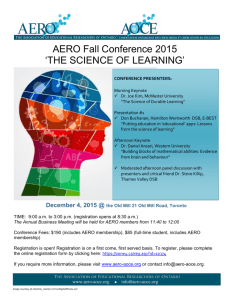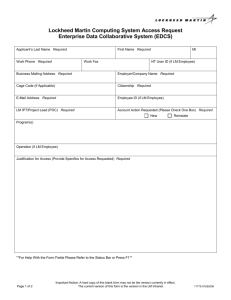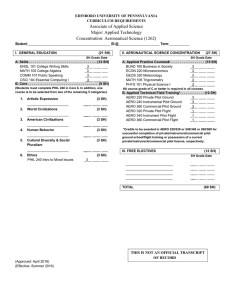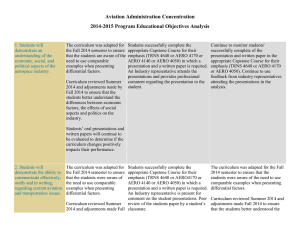Attachment 2.
advertisement
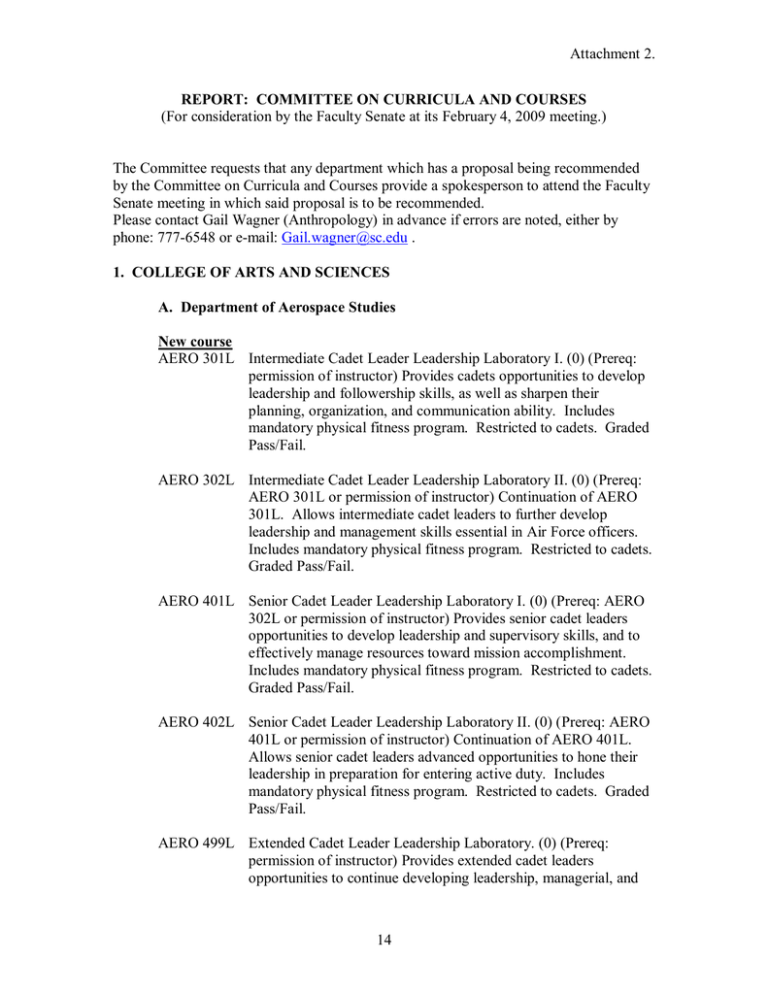
Attachment 2. REPORT: COMMITTEE ON CURRICULA AND COURSES (For consideration by the Faculty Senate at its February 4, 2009 meeting.) The Committee requests that any department which has a proposal being recommended by the Committee on Curricula and Courses provide a spokesperson to attend the Faculty Senate meeting in which said proposal is to be recommended. Please contact Gail Wagner (Anthropology) in advance if errors are noted, either by phone: 777-6548 or e-mail: Gail.wagner@sc.edu . 1. COLLEGE OF ARTS AND SCIENCES A. Department of Aerospace Studies New course AERO 301L Intermediate Cadet Leader Leadership Laboratory I. (0) (Prereq: permission of instructor) Provides cadets opportunities to develop leadership and followership skills, as well as sharpen their planning, organization, and communication ability. Includes mandatory physical fitness program. Restricted to cadets. Graded Pass/Fail. AERO 302L Intermediate Cadet Leader Leadership Laboratory II. (0) (Prereq: AERO 301L or permission of instructor) Continuation of AERO 301L. Allows intermediate cadet leaders to further develop leadership and management skills essential in Air Force officers. Includes mandatory physical fitness program. Restricted to cadets. Graded Pass/Fail. AERO 401L Senior Cadet Leader Leadership Laboratory I. (0) (Prereq: AERO 302L or permission of instructor) Provides senior cadet leaders opportunities to develop leadership and supervisory skills, and to effectively manage resources toward mission accomplishment. Includes mandatory physical fitness program. Restricted to cadets. Graded Pass/Fail. AERO 402L Senior Cadet Leader Leadership Laboratory II. (0) (Prereq: AERO 401L or permission of instructor) Continuation of AERO 401L. Allows senior cadet leaders advanced opportunities to hone their leadership in preparation for entering active duty. Includes mandatory physical fitness program. Restricted to cadets. Graded Pass/Fail. AERO 499L Extended Cadet Leader Leadership Laboratory. (0) (Prereq: permission of instructor) Provides extended cadet leaders opportunities to continue developing leadership, managerial, and 14 Attachment 2. communication skills, and to mentor junior cadet corps members. Includes mandatory physical fitness program. Restricted to cadets. Graded Pass/Fail. Change in title, corequisite and/or prerequisite, and description From: AERO 101 The Air Force Today I. (1) (Coreq: AERO 101L) Role of the Air Force in the contemporary world through a study of the total structure: strategic offensive and defensive forces, general purpose forces, and aerospace support forces. One class meeting per week. To: AERO 101 The Foundation of the U.S. Air Force I. (1) (Coreq for cadets only: AERO 101L or permission of instructor) Survey course introducing students to the U.S. Air Force and AFROTC. Topics include mission and organization of the Air Force, officership, professionalism, military customs and courtesies, and officer career opportunities. From: AERO 101L Initial Air Force Experiences I. (0) (Coreq: AERO 101) A leadership laboratory; drill, military customs, and courtesies, field trips, social functions, and briefings by visiting officers. Two meetings per week. (Pass/Fail only) To: AERO 101L Initial Military Training Cadet Leadership Laboratory I. (0) (Prereq: permission of instructor) Provides cadets the basic skills/knowledge to be functional members of the cadet corps, and activities to build camaraderie and esprit-de-corps. Includes mandatory physical fitness program. Restricted to cadets. Graded Pass/Fail. From: AERO 102 To: AERO 102 The Air Force Today II. (1) (Coreq: AERO 102L) A continuation of AERO 101. Support forces of the Air Force and other branches of the Armed Forces. One class meeting per week. The Foundation of the U.S. Air Force II. (1) (Coreq for cadets only: AERO 102L or permission of instructor) Continuation of AERO 101. Additional topics include Air Force core values, leadership principles, group leadership dynamics, and an introduction to verbal and written communications skills. From: AERO 102L Initial Air Force Experiences II. (0) Continuation of AERO 101L. Two meetings per week. (Pass/Fail only) To: AERO 102L Initial Military Training Cadet Leadership Laboratory II. (0) (Prereq: permission of instructor) Continuation of AERO 101L. Exposure to additional information on an Air Force career. Scenarios and problems teach followership and leadership skills. Includes mandatory physical fitness program. Restricted to cadets. Graded Pass/Fail. 15 Attachment 2. From: AERO 201 To: AERO 201 The Air Force Way I. (1) (Coreq: AERO 201L) Transition to Air Force officer candidate: Air Force heritage and leaders, introduction to leadership, group leadership problems, and application of communication skills. One class meeting per week. The Evolution of the U.S. Air Force I. (1) (Coreq for cadets only: AERO 201L or permission of instructor) Examines USAF air and space power from a historical perspective. Covers the earliest aircraft, both World Wars, the Korean and Vietnam conflicts, air and space employment during the Cold War. From: AERO 201L Initial Air Force Experiences III. (0) (Coreq: AERO 201) Continuation of AERO 102L. Two meetings per week. (Pass/Fail only) To: AERO 201L Field Training Preparation Cadet Leadership Laboratory I. (0) (Prereq: permission of instructor) Prepares cadets mentally and physically for rigorous field training. Emphasizes individual/flight drill, military customs and courtesies, dress and grooming standards. Includes mandatory physical fitness program. Restricted to cadets. Graded Pass/Fail. From: AERO 202 To: AERO 202 The Air Force Way II. (1) (Coreq: AERO 202L) Transition to Air Force officer candidate: Air Force heritage and leaders, introduction to leadership, group leadership problems, and application of communication skills. One class meeting per week. The Evolution of the U.S. Air Force II. (1) (Coreq for cadets only: AERO 202L or permission of instructor) Continuation of AERO 201. This course continues to explore Air Force history, beginning with the Vietnam era and culminating with the application of air and space power in recent conflicts. From: AERO 202L Initial Air Force Experiences IV/Preparation for Field Training. (0) (Coreq: AERO 202) Continuation of AERO 201. Preparation of students for summer training at an Air Force base; teaching drill and other leadership experiences. Two meetings per week. (Pass/Fail only) To: AERO 202L Field Training Preparation Cadet Leadership Laboratory II. (0) (Prereq: permission of instructor) Continuation of AERO 20lL. Focuses on AFROTC Honor Code, Field Training Manual/procedures, and expeditionary skills required at field training. Includes mandatory physical fitness program. Restricted to cadets. Graded Pass/Fail. From: AERO 301 Quality Air Force Leadership and Management I. (4) Management principles, functions, and practices; leadership theory; meaning of professionalism; Air Force personnel policies; communication 16 Attachment 2. To: AERO 301 From: AERO 302 To: AERO 302 skills; discipline and human relations. Three lectures and one twohour laboratory per week. Air Force Leadership Studies I. (4) (Coreq for cadets only: AERO 301L or permission of instructor) Study of leadership, management fundamentals, the profession of arms, personnel evaluation systems, ethics, motivation, team building, change management, and communication skills. Analyses of leadership and management case studies. Quality Air Force Leadership and Management II. (4) (Prereq: AERO 301 or permission of instructor) Continuation of AERO 301: management functions and practices, professional responsibilities, channels of communication, problem solving, administration, performance standards, career planning. Three lectures and one two-hour laboratory per week. Air Force Leadership Studies II. (4) (Prereq: AERO 301; Coreq for cadets only: AERO 302L or permission of instructor) Continuation of AERO 301. Topics include developing subordinates, conflict management, counseling, influence, authority and responsibility, accountability, and moral leadership. Includes case studies on effective supervision and accountability. Change in corequisite, prerequisite, and description From: AERO 401 National Security Affairs. (4) (Prereq: AERO 302 or permission of instructor) National security process, regional studies, Air Force doctrine, refinement of communication skills. To: AERO 401 National Security Affairs. (4) (Prereq: AERO 302 or permission of instructor; Coreq for cadets only: AERO 401L or permission of instructor) Study of U. S. Constitution, the Armed Forces, civilian control of the military, elements of national security, USAF doctrine, Total Force, the Joint environment, terrorism, and regional and cultural studies. From: AERO 402 To: AERO 402 Deletions AERO 399 AERO 415 Preparation for Active Duty. (4) (Prereq: AERO 401 or permission of instructor) National security process, regional studies, Air Force doctrine, refinement of communication skills. Preparation for Active Duty. (4) (Prereq: AERO 401 or permission of instructor; Coreq for cadets only: AERO 402L or permission of instructor) Continuation of AERO 401. Topics include additional regional studies, military justice, personnel feedback, evaluation and promotion systems, the military profession, current issues affecting the military, and preparation for active duty. Independent Study. (1-2) Principles of Flight. (3) 17 Attachment 2. B. European Studies Program Change in curriculum. Website 2008-2009 Undergraduate Bulletin – European Studies major requirements. 1-6-09 Requested copy from Jeff Persels. Current Proposed Degree Requirements Degree Requirements (120 hours) (120 hours) 1. General Education Requirements (53-62 hours) 1. General Education Requirements (53-62 hours) For a general outline, see "College of Arts and Sciences." For a general outline, see "College of Arts and Sciences." 2. Major Requirements (30 hours) 2. Major Requirements (24 hours) EURO 300 (3 hours) EURO 490 (3 hours) EURO 300 (3 hours) EURO 490 (3 hours) Electives (18 hours) selected from the approved EURO list with at least two different departments represented. A senior thesis (EURO 499) is an option. European language (6 hours at the 300 level) EURO students must demonstrate proficiency in one modern European foreign language other than English approved by the advisor at the advanced level by completing 6 hours in courses numbered 300 and above or the equivalent. Courses in that foreign language at the intermediate level (200 level), if needed as prerequisites, may be applied to the general education humanities requirement. Electives (18 hours) selected from the approved EURO list with at least two different departments represented. A senior thesis (EURO 499) is an option. 3. Cognate or Minor (12-18 hours) 3. Cognate or Minor (12-18 hours) See "College of Arts and Sciences." See "College of Arts and Sciences." 4. Electives 4. Electives See "College of Arts and Sciences." See "College of Arts and Sciences." EURO students must demonstrate proficiency in one modern European foreign language other than English approved by the advisor at the advanced level by completing 6 hours in courses numbered 300 and above or the equivalent. These hours, however, do not count toward the EURO major. Courses in that foreign language at the intermediate level (200 level), if needed as prerequisites, may be applied to the general education humanities requirement. 18 Attachment 2. C. Film and Media Studies Program New course FILM 470 Genre Studies in Film and Media. (3) Critical study of a popular genre (e.g., horror, science fiction, melodrama), or set of genres, in film and media. Course content varies and will be announced in the schedule of courses by suffix and title. May be repeated as topics vary. D. Department of Languages, Literatures, and Cultures Change in title From: CPLT 300 To: CPLT 300 Introduction to Comparative Literature. (3) What is Comparative Literature. (3) E. Department of Philosophy New course PHIL 306 Ancient Philosophy. (3) An introduction to the work of ancient philosophers, with special emphasis on Plato and Aristotle. F. Department of Theatre and Dance New course DANC 476 THEA 563 Production Design for Dance. (3) Technical theatre functions, the structure and purpose of production design, and stage production as it relates to the whole of dance and theatrical performance. History of Modern Theatre. (3) History of Western Theatre since the early 20th century. Students will be introduced to major figures, plays, and movements and explore influences from the broader culture on theatrical expression. 2. COLLEGE OF ENGINEERING AND COMPUTING Department of Mechanical Engineering New course EMCH 362 Mechanical Engineering Laboratory II. (3) (Prereq: EMCH 361, ELCT 220 or 221; Prereq or Coreq: EMCH 360, 310) Introduces design of experiments with emphasis on confidence levels, dimensional analysis, correlations or experimental data, experimental variance, and uncertainty analyses. Oral and written reports. Excluded: Mechanical Engineering majors. 19 Attachment 2. Change in title, prerequisite, corequisite, and description From: EMCH 361 Measurements and Instrumentation. (3) (Prereq: ELCT 220 or ELCT 221, STAT 509, PHYS 212, prereq or coreq: EMCH 260) Restricted to upper division. Principles of measurement, probability of statistics, analysis of data, and experimental planning. Measurement of parameters in mechanical engineering systems. To: EMCH 361 Mechanical Engineering Laboratory I. (3) (Prereq: STAT 509, PHYS 212; Prereq or Coreq: EMCH 260, 290) Principles of measurement, analysis of data, and experimental planning. Written and oral presentation techniques. Change in credit hours and prerequisite From: EMCH 371 Engineering Materials. (4) (Prereq: EMCH 260 and EMCH 361) To: EMCH 371 Engineering Materials. (3) (Prereq: EMCH 260) Change in prerequisite and corequisite From: EMCH 427 Mechanical Design I. (3) (Prereq: EMCH 327, 354, 371, 394, ECON 421, STAT 509; Coreq: EMCH 332) To: EMCH 427 Mechanical Design I. (3) (Prereq: EMCH 327, 354, 371, 394, ECON 421; Prereq or Coreq: EMCH 332, 362) Change in title, course number, credit hours, prerequisite, corequisite and description From: EMCH 467 Mechanical Engineering Laboratory. (2) (Prereq: EMCH 327, EMCH 354, EMCH 367, EMCH 394) Experiments directly related to advanced mechanical engineering courses. Written and oral presentation techniques. To: EMCH 363 Mechanical Engineering Laboratory III. (3) (Prereq: EMCH 362; Prereq or Coreq: EMCH 332, 354, 371) Experiments directly related to advanced mechanical engineering courses. Physical and statistical design of experiments. Written and oral reports. Change in curriculum. Website 2008-2009 Undergraduate Bulletin – Mechanical Engineering Current Proposed Degree Requirements Degree Requirements Mechanical Engineering Curriculum (126 hours) ENGL 101, 102 (6 hours) ECON 421 (3 hours) Mechanical Engineering Curriculum (126 hours) ENGL 101, 102 (6 hours) ECON 421 (3 hours) 20 Attachment 2. Freshman elective (3 hours) Ethics elective (3 hours) History elective (3 hours) Fine arts elective (3 hours) Arts and Sciences (curriculum I) elective (3 hours) Freshman elective (3 hours) Ethics elective (3 hours) History elective (3 hours) Fine arts elective (3 hours) Arts and Sciences (curriculum I) elective (3 hours) Math and Science MATH 141, 142, 241, 242 (14 hours) CHEM 111, 112 (8 hours) PHYS 211, 211L, 212, 212L (8 hours) STAT 509 (3 hours) Math and Science MATH 141, 142, 241, 242 (14 hours) CHEM 111, 112 (8 hours) PHYS 211, 211L, 212, 212L (8 hours) STAT 509 (3 hours) Engineering Topics ELCT 221 or ELCT 220 (3 hours) EMCH 111, 200, 201, 260, 290, 310, 327, 332, 354, 360, 361, 367, 371, 377, 394, 427, 428, 467 (54 hours) Engineering electives (12 hours) A listing of acceptable elective courses is maintained in the department office. Engineering Topics ELCT 221 or ELCT 220 (3 hours) EMCH 111, 200, 201, 260, 290, 310, 327, 332, 354, 360, 361, 362, 363, 371, 377, 394, 427, 428 (54 hours) Engineering electives (12 hours) A listing of acceptable elective courses is maintained in the department office. 3. COLLEGE OF HOSPITALITY, RETAIL, AND SPORT MANAGEMENT A. Department of Retailing Change in curriculum. Website 2008-2009 Undergraduate Bulletin. Current Proposed 2. Major Requirements 2. Major Requirements RETL 261, 262, 265, 301, 344, 366, 369; TSTM 240, 264, 342; MKTG 350; HRSM 301 (34 hours) RETL 261, 262, 265, 301, 344, 366, 369, 485; TSTM 240, 264, 342; MKTG 350; HRSM 301 (37 hours) 3. Emphasis Requirements (27-30 hours) 3. Emphasis Requirements (27-30 hours) Retail Management: RETL 350, 351, 425, 465, 487, and 9 additional hours of RETL courses selected from the following: RETL 201, 237, 268, 310, 365, 368, 388, 399, 460, 491, 525, or 562 (27 hours) Retail Management: RETL 350, 351, 425, 465, 487, and 9 additional hours of RETL courses selected from the following: RETL 201, 237, 268, 310, 365, 368, 388, 399, 460, 491, 525, 551, or 562 (27 hours) Fashion Merchandising: RETL 268, 365, 368, 388, 425, 462, 463, and 6 additional hours Fashion Merchandising: RETL 268, 365, 368, 388, 425, 462, 463, and 6 additional hours 21 Attachment 2. of RETL courses selected from the following: RETL 201, 237, 310, 350, 351, 399, 460, 487, 491, 525, or 562 (30 hours) of RETL courses selected from the following: RETL 201, 237, 310, 350, 351, 399, 460, 487, 491, 525, 551, or 562 (30 hours) B. Department of Sport and Entertainment Management New course SPTE 545 Managing Part-Time Employees and Volunteers. (3) Recruiting, hiring, training, and retaining part-time employees and volunteers in sport and entertainment. *?SPTE 590 Special Topics in Sport and Entertainment. (3) Investigation of special topics pertinent to the sport and entertainment management industry. *?SPTE 640 Venue Management. (3) (Prereq: departmental permission) Managing public assembly facilities and venues. 4. COLLEGE OF NURSING Change in prerequisite From: NURS 216 Biophysical Pathology. (3) (Prereq: CHEM 102, NURS 220, and MATH 111 or placement score of B22) To: NURS 216 Biophysical Pathology. (3) (Prereq: CHEM 102, NURS 220, and BIOL 243 or EXSC 223) 5. ARNOLD SCHOOL OF PUBLIC HEALTH Department of Health Promotion, Education, and Behavior Change in prerequisite and description From: HPEB 502 Applied Aspects of Human Nutrition. (3) (Prereq: BIOL 102 or equivalent, CHEM 101 or equivalent, or consent of instructor) Nutrition and basic biological needs of man, metabolic mechanisms, and energy requirements; nutritional requirements as related to health education programs. To: HPEB 502 Applied Aspects of Human Nutrition. (3) Application of nutrition principles including functions of food and nutrients in health and disease prevention throughout the life cycle. Applied topics include weight management, food safety, and other contemporary issues. 22
